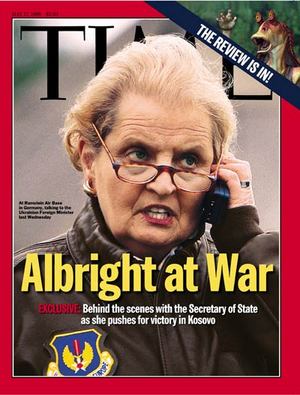“Advancing the status of women is not only a moral imperative; it is being actively integrated into the foreign policy of the United States. It is our mission. It is the right thing to do, and, frankly, it is the smart thing to do.”
Secretary of State Madeleine K. Albright, March 12, 1997
Madeleine Albright created a stir as a card-carrying, no-nonsense Democratic woman when she was nominated as President Bill Clinton's Secretary of State in 1997. After her nomination was confirmed by the Senate, Albright became the first female Secretary of State in the US. Although Czech-born and an escapee of Hitler's Nazi policies, Albright jumped headfirst into American politics and education. She received her BA from Wellesley College (where Hillary Clinton would later attend), and her master's degree and Ph.D. from prestigious Columbia University. Albright focused much of her time and energy on non-profit work and public service, as well as on political campaigns and security issues.
Before serving as the first female Secretary of State, Madeleine Albright was named the US ambassador to the United Nations, "At the UN she gained a reputation for toughmindedness as a fierce advocate for American interests, and she promoted an increased role for the United States in UN operations, particularly those with a military component (Encyclopedia Britannica Online). Even when she was the UN ambassador, Albright used her position as her intelligence in order to set herself up for the Secretary of State job, if the opportunity would ever arise for her to obtain that appointment. When the Secretary of State from Clinton's first four years in office stepped down, Senator Patrick Leahy contacted Albright. He played devil's advocate with this bright woman, and was surprised by how prepared she was, "...she gave him chapter and verse on what the United States and State Department needed to accomplish during the next four years, spelling out her worldview in no uncertain terms, emphasizing her vision of the United States as an 'indispensable nation'" (Blood 8).
Albright also knew all along that if she wanted a chance at Secretary of State, she had to act the part. In his book Madam Secretary: A Biography of Madeleine Albright, Thomas Blood highlights the lengths that Madeleine went to in order to educate herself further and become more involved at the international level in order to show everyone she was serious. Albright visited little-known and usually ignored cities and countries around the world-the places that then Secretary of State Warren Christopher tended to take off of his radar. In doing this, Albright was marking up political credentials left and right, but also creating relationships with these countries that hadn't existed before. The military's support was of special interest to Albright, "Albright made a special point of of becoming intimately acquainted with her essential foreign policy partner, the military, rarely missing an opportunity to court key members of the armed forces" (Blood 10). She flew into war zones and made her interest in foreign policy and support known.
The whole time Bill Clinton had known Albright, he voiced his opinion on her talents, often saying, "she gives the best public articulation of my foreign policy of any person around" (Blood 28). Even First Lady Hillary Clinton desperately wanted to see Albright get the position of Secretary of State, but instead of pushing her husband towards it, Hillary chose to support Albright from behind the scenes, helping to secure support for the nomination among the media and women. The media loved Madeleine, proclaiming her emminent nomination and celebrating before she had even received the offer from President Clinton. Obviously, Albright's massive efforts paid off, as she was recognized by Clinton and received his nomination for Secretary of State in 1997.
The woman that stands before us today as former Secretary of State went through so much to achieve her lofty goals. She worked on Edmund Munskie's 1972 presidential campaign, and became close friends with him although he lost the election. As fellow staffer Billings stated, "There were times that some of the staff were so afraid of him that they would literally run away and hide" (Blood 120). However, Albright was not one of these scared staffers. She was never intimidated, and was able to put up with Muskie's somewhat scary manner. He came to view her as a trusted peer, rather than a staffer, and consulted with Albright on many important issues (Blood 120-121). Not only did Albright have her gender working against her in the political realm, her age was also a factor she had to overcome (she was nearly forty when she came to work on Capitol Hill). Blood calls these the two glass ceilings that Albright had to break through just to begin her career in Washington, DC (Blood 121). As a woman and a middle-aged woman, she was supposed to still be in her home taking care of children, not out serving on political campaigns and foreign policy advisories.
Madeleine Albright is the ultimate woman to look to when we think of the American dream for women. Her family was persecuted by the Nazis and forced to flee their homeland for the United States. She became more involved and educated than many men of her time, and wouldn't take 'no' as an answer for anything. Albright truly defied the odds handed to her as a middle-aged woman in America, and gained the publics' trust and respect as well as that of her colleagues and superiors. She worked harder to achieve her goal to be Secretary of State than any man I have read about, and continues to be an activist and supporter of the Democratic Party even today at age 75. Madeleine Albright will go down in history as one of the greatest women in the United States for her groundbreaking work and examples she set.



No comments:
Post a Comment